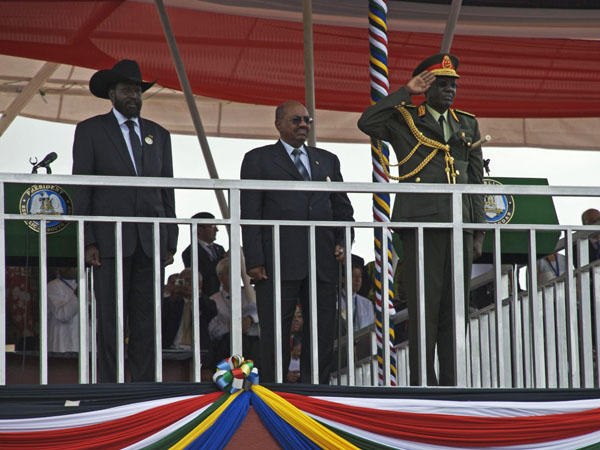
Relations between Sudan and South Sudan have sunk to the lowest level since the South declared independence in July 2011. “We tell our brothers in the south that if they want peace, we want peace. If they want war, our army is there,” said Sudanese President Omar al-Bashir in the Blue Nile capital of Damazine earlier this week in an event to declare the “liberation” of the former rebel stronghold of Kurmuk. Warning South Sudan against providing assistance to the Sudan People’s Liberation Movement/Army-North, or SPLM/A-N, Bashir reportedly said, “[Y]ou won the south not because you were victorious but because of an agreement and a pledge we upheld, so you had better stay in your place.”
Sudan’s foreign ministry submitted a new complaint to the United Nations Security Council, accusing South Sudan of “supplying anti-aircraft and anti-tank missiles, ammunition, landmines and mortars to the insurgent Sudan People's Liberation Army North (SPLA-N).” The first complaint was submitted in August.
Bashir’s remark about Khartoum’s readiness to return to war is troubling considering the regime’s recent tendency to choose armed force as the method for solving outstanding political disputes. The “lessons” of Abyei, Kadugli, and al-Damazin that Bashir referred to in his speech, as reported by Sudan Tribune, involve the occupation of Abyei and mass displacement of the civilians living there, documented human rights abuses by the Sudanese army and its allied militias, indiscriminate aerial bombardments, and the ongoing displacement of hundreds of thousands of people in South Kordofan and Blue Nile.
(It should be noted that SPLA-N commander Malik Agar's efforts to create a bigger politico-military alliance against the Khartoum regime point toward SPLM-N's growing inclination for a military solution as well. In conversations with the Enough Project, Agar does not shy away from noting that overthrowing the Khartoum regime could be an ultimate goal for SPLM-N.)
So, facing continued challenges on various fronts from armed opposition groups in his own country and some international condemnation—albeit surprisingly lackluster—for military operations in the Three Areas and Darfur, Bashir is turning his attention to blaming South Sudan. The impact of separation on the North’s oil revenues—75 percent of the North’s oil came from the fields in the South Sudan—has been very difficult on the Khartoum regime, particularly amid economic strains in Sudan broadly. In the words of a ruling NCP official “it would take two years at least for the North’s economy to adjust to the loss of the south.”
As pointed out in a blog post last week, the South Sudan government blames Khartoum for actions of the remaining rebel groups in the country. Juba has accused Khartoum of aiding rebel groups to destabilize South Sudan, with the ultimate ambition of keeping a grip on South Sudan’s oil. Officials from Juba have also credited the Khartoum regime with aiding rebels in the recent clashes in the oil-rich Unity state.
Combative rhetoric and mutual accusations are looming over the ongoing post-split negotiations that are currently focused on how much the South will pay to transport oil through the North, the implementation of the temporary Abyei agreement, and a border security agreement. Rising tensions between the parties underscore the lack of political urgency both sides feel in reaching a resolution, despite the practical needs for a deal. While South Sudan has high hopes for what the oil revenue can achieve for its development, Sudan needs to work out a deal that would ease its economic woes.
To suggest that relations between the two countries might soon deteriorate into full-scale war may be alarmist for now, especially in light of Sudanese leaders’ propensity for resorting to brinkmanship rhetoric when the stakes are high. However, skirmishes along the border and ongoing support for each other’s adversaries—of course with devastating impact on civilians—will likely continue. A challenge predicted by Enough’s John Prendergast in an op-ed last spring appears to have been all too prescient: “[I]f Khartoum feels that it can get away with yet another violation of the peace agreement in Abyei, other territorial seizures of strategic oil fields will follow.”
The burden of more than half a century of conflict between, what is seen as, the Arab North and African South is weighing heavily over the future of the both countries. A historical heritage of animosity and broken agreements is again threatening to re-ignite conflict.
The situation is unfortunately reminiscent of a joke mentioned by esteemed Sudan scholar Francis M. Deng in a paper a few years back. Quoting a caricature of a northerner, Deng wrote: “We fought the south for all these years because of their mango trees. Now that oil has been found on their land, how can we leave them in peace.”
Amanda Hsiao contributed to this post.
Photo: Presidents Bashir and Kiir at South Sudan's independence ceremony (Enough/Laura Heaton)

